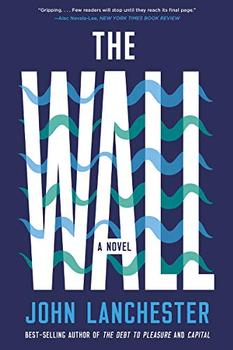Summary | Excerpt | Reading Guide | Reviews | Beyond the book | Read-Alikes | Genres & Themes | Author Bio

Veteran journalist and award-winning novelist John Lanchester ventures into the dystopian with this apocalyptic allegory about the dangers of climate change and, in particular, how dire circumstances can lead to tribalism and indemnification of the "other." The titular wall stands in for any border that is meant to keep some people out. But for American readers, it bears a particular significance to the political situation in the U.S., where the southern border wall has become the object of almost rabid contention.
When the novel begins, a young man named Joseph Kavanagh has just arrived on the Wall for his mandatory two-year stint as a Defender. The Wall is 6,000 miles long and abuts the ocean, and it was erected to keep the "Others" out of Kavanagh's country/society. (The Others are seeking safety after an undisclosed climate change disaster.) Defenders who fail in their role are sent out to sea on a lifeboat with minimal supplies, an almost certain death sentence, and this is exactly what happens to Kavanagh and his friends after the Others launch a bold attack on the Wall. Out on the open sea, Kavanagh and his girlfriend Hifa (a fellow Defender) find a group of friendly, boat-dwelling Others that accept them into their clan, but just as they begin to get comfortable, they are faced with a dangerous storm and the arrival of an ominous ship full of mysterious visitors.
Lanchester does not offer any unique philosophical insight into the theme of us vs. them, and his apocalyptic world is much the same as any other featured in the onslaught of similar literature published over the past two decades, but The Wall is absolutely brimming with suspense and excitement. Its doomsday premise aside, it is perhaps more of an adventure novel than strictly dystopian. It is well paced, as Lanchester takes his time establishing the conditions on the Wall (frigid and mind-numbing) and catalogs the minutia of the Defenders' training exercises. In the hands of a less skilled writer, this careful plotting and abundance of detail might seem extraneous, but it never feels that way here. Even a long description of Kavanagh eating a protein bar is perfectly rendered to demonstrate the pervasive boredom and misery of life on the Wall; the snack is the only thing Kavanagh has to look forward to for hours at a time while rigidly staring into space, so he painstakingly analyzes every bite.
Kavanagh's position as a Defender is likely meant to be compared to that of a contemporary border guard or member of the military. He is a low-level grunt, merely following orders and doing his job, largely unsympathetic to the plight of the Others, whatever it may be. (Kavanagh does not know any specifics about the situation wherever the Others are coming from, only that it must be pretty dire for them to brave the Wall.) However, when he is set out to sea, he essentially becomes one of them. Lanchester captures Kavanagh's reaction to his change in circumstance eloquently: "I had heard the word 'despair' and thought I knew what it meant...Your worst fear: track it down inside yourself. Take a good look at it. And face the fact that it will happen. The thing you dread most will happen. When it does, the name of the thing you're feeling is despair." This reversal is the closest Lanchester makes to editorializing – be kind to outsiders, as someday you might become one yourself – but it is a well-made point. Kavanagh and Hifa manage to rally from this despair and battle their way towards survival, but ultimately they are saved by a deus ex machina reversal of fortune that is slightly abrupt.
While The Wall might not provide any deep introspective examination of its subject matter, that simply doesn't seem to have been the goal. Instead, Lanchester offers an action-heavy excursion in an extreme environment with a protagonist that is brave, but also flawed and relatable. There's a lot to be said for a novel that is just plain fun to read.
![]() This review was originally published in The BookBrowse Review in March 2019, and has been updated for the
April 2020 edition.
Click here to go to this issue.
This review was originally published in The BookBrowse Review in March 2019, and has been updated for the
April 2020 edition.
Click here to go to this issue.

If you liked The Wall, try these:

by Paul Lynch
Published 2024
Exhilarating, terrifying and surprisingly intimate, Prophet Song offers a shocking vision of a country at war and a deeply human portrait of a mother's fight to hold her family together.

by Rumaan Alam
Published 2021
A magnetic novel about two families, strangers to each other, who are forced together on a long weekend gone terribly wrong.
Your guide toexceptional books
BookBrowse seeks out and recommends the best in contemporary fiction and nonfiction—books that not only engage and entertain but also deepen our understanding of ourselves and the world around us.